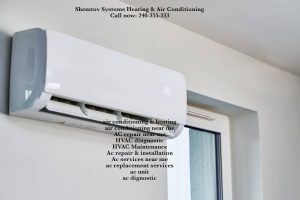Home » Blog » Maximizing Cost-effectiveness: Smart Solutions for HVAC Services

air conditioning & heating
air conditioning near me
AC repair near me
HVAC diagnostic
HVAC Maintenance
Ac repair & installation
Ac services near me
ac replacement services
ac unit
ac dignostic
Maximizing Cost-effectiveness: Smart Solutions for HVAC Services
In the realm of commercial and residential spaces, heating, ventilation, and air conditioning (HVAC) systems play a crucial role in maintaining comfort and productivity. However, the operation and maintenance of HVAC systems can often translate into significant expenses for property owners and managers. To mitigate these costs while ensuring optimal performance, implementing cost-effective solutions becomes paramount. Here, we delve into several strategies to maximize cost-effectiveness in HVAC services.
- Regular Maintenance and Inspection: Proactive maintenance is key to preventing costly breakdowns and inefficiencies. Scheduled inspections allow for the early detection of potential issues, such as worn-out components or refrigerant leaks. By addressing these issues promptly, property owners can avoid more extensive repairs and prolong the lifespan of their HVAC systems.
- Energy-efficient Upgrades: Upgrading to energy-efficient HVAC equipment not only reduces operational costs but also enhances environmental sustainability. High-efficiency HVAC units consume less energy while delivering comparable or superior performance to their conventional counterparts. Additionally, advancements in technology have led to the development of smart HVAC systems equipped with features like programmable thermostats and zoning capabilities, further optimizing energy usage.
- Air Quality Improvement: Poor indoor air quality not only compromises comfort but also poses health risks to occupants. Implementing measures to enhance air quality, such as regular filter replacements and the installation of air purifiers or ventilation systems, can improve HVAC efficiency and mitigate the likelihood of respiratory issues among occupants. Investing in air quality improvement contributes to long-term cost savings by reducing sick building syndrome-related absenteeism and enhancing overall productivity.
- Smart Controls and Automation: Leveraging smart controls and automation technologies allows for precise monitoring and management of HVAC systems. By integrating sensors and smart thermostats, property owners can optimize heating and cooling schedules based on occupancy patterns and external weather conditions. Additionally, predictive maintenance algorithms can identify potential equipment failures before they occur, minimizing downtime and repair costs.
- Strategic Retrofitting: Retrofitting existing HVAC systems with cost-effective upgrades can yield significant savings compared to complete replacements. Strategies such as duct sealing, insulation improvements, and variable frequency drives (VFDs) installation enhance system efficiency without the need for extensive capital investment. Conducting a thorough energy audit can identify retrofitting opportunities tailored to the specific needs of the property, maximizing cost-effectiveness.
- Performance Monitoring and Analytics: Real-time performance monitoring coupled with data analytics provides actionable insights into HVAC system efficiency and operation. By analyzing energy consumption patterns and performance metrics, property owners can identify opportunities for optimization and resource allocation. Continuous monitoring enables proactive adjustments to HVAC settings and maintenance schedules, ensuring peak performance while minimizing operational costs.
- Vendor Management and Negotiation: Partnering with reputable HVAC service providers and negotiating service contracts can result in cost savings through competitive pricing and favorable terms. Establishing long-term relationships with trusted vendors fosters accountability and ensures timely response to maintenance and repair needs. Additionally, exploring alternative procurement models, such as performance-based contracts or leasing options, can align costs with actual system performance and usage.
- Employee Training and Awareness: Equipping building occupants and maintenance staff with the necessary knowledge and skills fosters a culture of energy efficiency and proactive maintenance. Training programs focused on HVAC system operation, maintenance best practices, and energy-saving strategies empower individuals to identify and address issues promptly, minimizing downtime and unnecessary expenses.
In conclusion, optimizing cost-effectiveness in HVAC services requires a multifaceted approach encompassing proactive maintenance, energy-efficient upgrades, air quality improvements, smart controls, strategic retrofitting, performance monitoring, vendor management, and employee training. By implementing these strategies, property owners can achieve significant cost savings while enhancing comfort, productivity, and environmental sustainability. Investing in cost-effective HVAC solutions not only mitigates immediate expenses but also yields long-term benefits for both the bottom line and the overall well-being of building occupants.

 Request a Service
Request a Service





